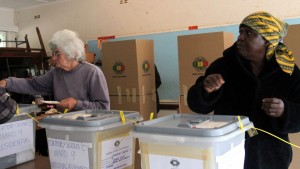 The government of Zimbabwe already owns mobile operator NetOne and TelOne – the fixed phone provider that also retails internet services and runs the country’s internet gateway.
The government of Zimbabwe already owns mobile operator NetOne and TelOne – the fixed phone provider that also retails internet services and runs the country’s internet gateway.
This year, the government completed payment for a 60% stake in Telecel Zimbabwe, previously controlled by VimpelCom.
Mandiwanzira, who is now speeding up a cybercrimes law widely seen as curbing social media communications critical of government policies, said on Wednesday it is important for the government to have wider interests in the telecommunications sector.
“The telecommunications sector has become an important industry and nobody can do without it. If you have such a sector which determines how you vote (through biometric voter registration) and your banking sector you don’t want that industry in the hands of someone who wakes up one day and makes a decision to leave,” Mandiwanzira said on Wednesday
There has been haggling between the government and non-governmental organisations as well as opposition political parties over the awarding of the tender for biometric voter registration kits. Opposition parties argue that the government should not be involved in the process.
Pedzisai Ruhanya of the Zimbabwe Democracy Institute explained on Thursday that Zimbabwe is now waiting for the tender for the biometric voting platform to be awarded. It will entail high-tech kits such as computers and laptops among others.
The government will however likely dispose of its interests in Telecel Zimbabwe after next year’s elections. “We (will) decide 18 months after buying it (Telecel Zimbabwe) what to do with it,” said Mandiwanzira.
The government’s keenness to control the telecoms industry has expanded into the regulatory sector, with a computer and cybercrimes law now being finalised, according to government officials.
A draft version of the law says “a person, who intentionally … initiates any electronic communication, with the intent to coerce, intimidate, harass, or cause substantial emotional distress to a person, using a computer system … commits an offence” that is punishable.
On conviction, offenders will be imprisoned “for a period not exceeding five years” or a fine.
Critics say the law is targeted at social media activists who organise demonstrations through WhatsApp, Twitter and Facebook among other platforms, and to contain social messages critical of the government.
Mandiwanzira however said the government does not intend to snoop on private communications with the computer and cybercrimes bill, but to protect telecommunications consumers.
Post published in: Featured

